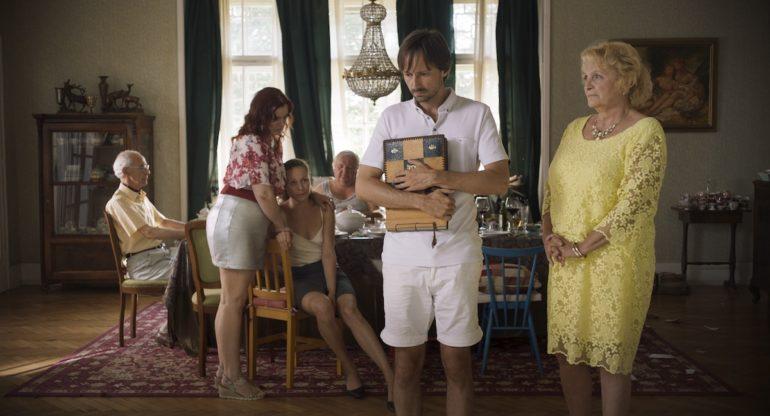‘Cook F**k Kill’: Film Review
By Alissa Simon
LOS ANGELES (Variety.com) – The scabrously-titled absurdist drama “Cook F**k Kill” from Slovak multihyphenate Mira Fornay (“Little Foxes,” “My Dog Killer”) is Examining unhealthy relationships, it’s structured as a prologue and three chapters, all of which make imaginative use of metaphor and anxiety-inducing images and framing. The stylized action sometimes brings to mind Swedish helmer Johannes Nyholm’s “Koko-di Koko-da,” also about a couple stuck in a damaging behavioral pattern. Overall, the film is a tad too long and definitely not for everyone, yet it is without doubt Fornay’s most ambitious and stimulating work. Festivals with adventurous programming venues should take note.
A 64-second prologue, featuring a Greek chorus of female villagers in swimsuits on the bank of a river recounting a fable to a figure in the water, manages to introduce many of the film’s key themes, concepts, and visuals. The folk tale that the women recite emphasizes how everything is interconnected and how difficult it is to change animal or human nature. Shots of the river, swimming figures, a frog, and the female chorale occur again and again throughout the film. But, unfortunately, the epigrammatic neatness displayed here is lacking in the film’s more baggy second and third chapters.
At the center of the linked cobweb of relationships that Fornay presents are married couple Jaroslav (Jaroslav Plesl) and Blanka (Jazmína Cigánková) and their problems. Ambulance driver Jaroslav is pathologically jealous, afraid that his policewoman wife will leave him and take their three children. Meanwhile, in a recurring example of what is feared turning into something foretold, Blanka removes the children from the under-construction family home and leaves them with her grandmother. Moreover, she locks granny’s garden gate and takes the key. As the distraught Jaroslav tries but fails to enter the yard, the kids hide from him, but he sees both his son and granny’s white dog, lying in the grass, not moving.
In exchange for the key to the grandmother’s gate, Blanka wants the apartment owned by Jaroslav’s taunting, withholding mother Dorota (Regina Rázlová). Dorota will agree if her wealthy, refined ex-husband Kamil (Jan Alexander) will cook them a family dinner. Kamil will accede only if the hulking, brutish Gustav (Bohuslav Zárychta), who is Blanka’s father and Dorota’s current lover, will kill an ox. As Jaroslav scrambles to facilitate the fulfillment of these various conditions, the three chapters of the film play out different versions of his odyssey, each one allowing viewers access to more information about the central couple and their relatives.
Unfolding over 27 minutes, the first version of events is perhaps the most striking, literally and figuratively. As Jaroslav searches for Blanka, he is menaced by women in the supermarket, including his mother-in-law Jana (Irena Bendová), who proclaim his private problems aloud, insisting that they are known to everyone in the small town. After narrowly escaping being crushed by a jukebox that falls from a window, Jaroslav goes to cook lunch for his mother who, rather stunningly, emerges from the bathroom, wearing only a facial masque. As Jaroslav chops vegetables, Dorota provocatively carries on with Gustav. Much violence later ensues, with Jaroslav admitting that he loves Blanka in the same way that Gustav loved Jana, while Blanka narrates the terrible beatings that her mother endured as Gustav inflicts them on Jaroslav. This scene terrifyingly captures the psychology and brutality of an abuser.
The much longer second and third chapters give Jaroslav a chance to avoid the mistakes he made in the first. But even as he takes on the female identity Jaroslava (Petra Fornayová) in the final section, the tragic end result is ultimately the same.
Although Fornay spent several years researching domestic violence and sexual abuse for this project, her screenplay transplants these issues into a disturbing fairytale realm where viewers must rely on unconscious connections rather than logical social norms. She also builds foreboding through dialogue repetition, particularly Jaroslav’s plaintive refrain, “I’m worried about the children.”
The potent production design by Jana Boháčková contrasts white and blood red, supporting the film’s primal intensity and supplying foreshadowing. Also complementing the mood is an edgy sound design from Dominik Dolejší. Strategic use of “Everybody Loves Somebody” by Frank Sinatra and Dean Martin and “Love Must Die” by the Dakh Daughters pleasantly ups the absurdity quotient.
Of the game cast comprising both Czechs and Slovaks, pros and non-pros, the standout player is Rázlová, a longtime star of stage, screen and TV, who approaches nudity, sexuality, and shrewishness with a compelling fearlessness.

